Attending the conference were famous scientists in many fields of social sciences and humanities such as: Prof. Dr. Pham Tat Dong (Vice President of Vietnam Association for Promoting Education), Prof. Dr. Dang Canh Khanh (Director of the Institute for Traditional and Development Studies), Prof. Dr. Nguyen Huu Khien (former Deputy Director of the National Academy of Public Administration), Assoc. Prof. Dr. Nguyen Minh Phuong (Vice Rector of Hanoi University of Home Affairs), Assoc. Prof. Dr. Tran Thi Thanh Thuy (Deputy Director of the Institute of Leadership and Public Policy), Colonel Le Duc Cuong (Foreign Affairs Department, Ministry of National Defense), Assoc. Prof. Dr. Ngo Thanh Can (National Academy of Public Administration), Assoc. Prof. Dr. Tran Thi Minh Ngoc (Head of the Department of Sociology, Academy of Politics Region 1)...
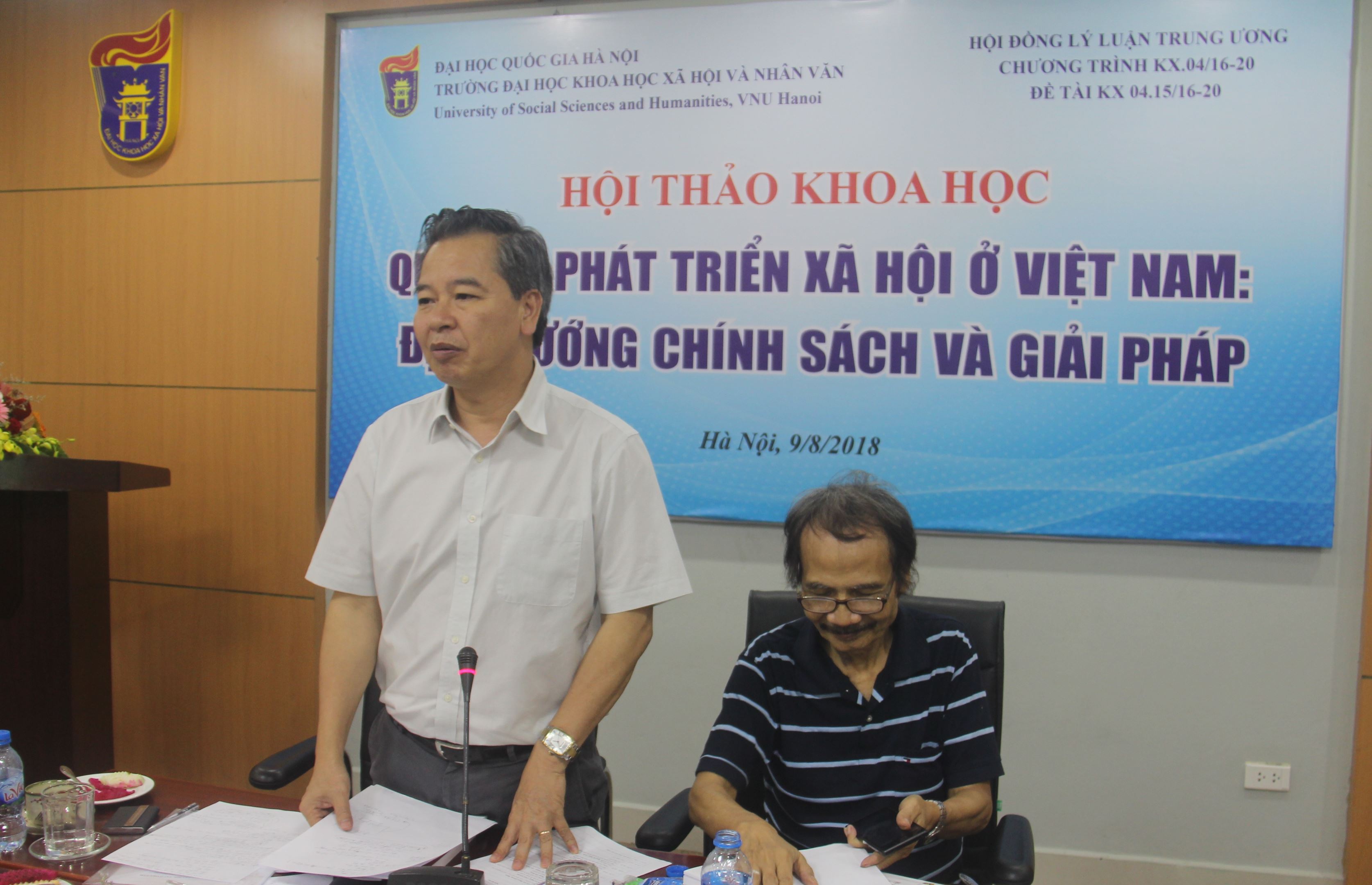
Prof. Dr. Pham Quang Minh (Rector of University of Social Sciences and Humanities, Project Manager) delivered the opening speech at the Workshop.
The workshop received nearly 20 presentations contributing ideas for the orientation of building social security policies in Vietnam from many perspectives: social security and human safety, factors affecting the process of social security, the role of the grassroots political system in social security, on social abnormality management, the impact of administrative reform on social security, innovation in social assistance policies, social security in the context of market economy development and international integration, the role of social organizations in social security, overcoming social inequality and polarization between rich and poor from social security policies, social security in the field of health insurance, etc.
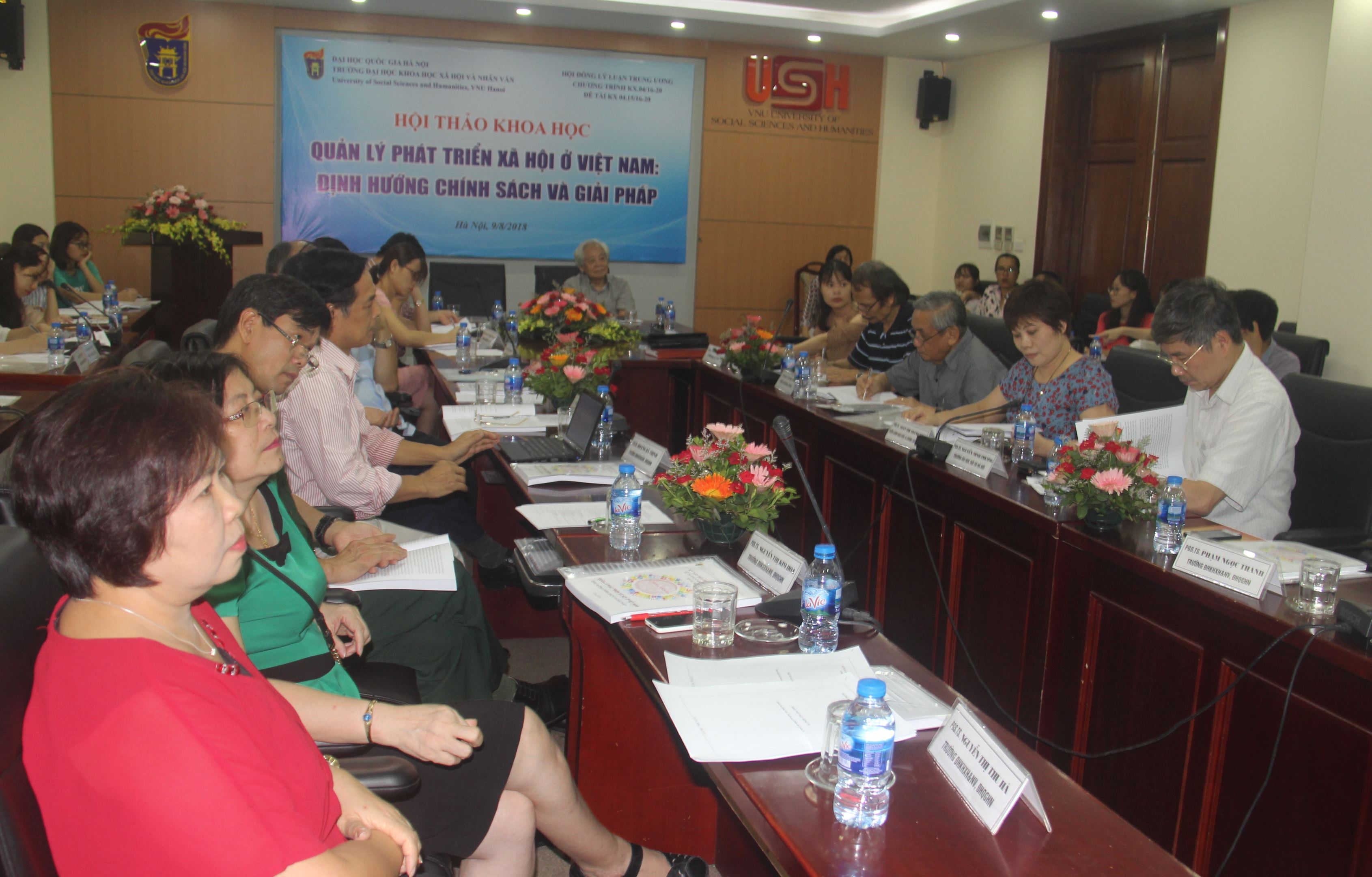
The workshop was attended by many leading scientists in the fields of social sciences and humanities.
In the report introducing the workshop, Prof. Dr. Pham Quang Minh (Project leader) mentioned the importance of research on social management in the current context. Accordingly, effective and correct social management is the most fundamental issue to implement the socialist orientation in our country. Social management determines the maintenance of social order, prevention of the risk of conflict, improvement of people's material and spiritual life, and motivation for socio-economic development. In the context of integration and promotion of international cooperation, many urgent issues on social management in Vietnam are being raised, requiring to be solved with a new mindset, with a new system of policies and practices of social management.

Prof. Dr. Pham Tat Dong (Vice President of Vietnam Association for Promoting Education)) emphasizes that social security should aim to improve the security capacity of each individual and community.
Presenting on “Social Security and Human Safety”, Prof. Dr. Pham Tat Dong said that social security policies should focus on improving the security capacity of each individual and each community and focus on relying on local knowledge. In particular, solutions to support people should aim at improving knowledge, expanding understanding and job search skills for people to create sustainable effectiveness.
Professor Dang Canh Khanh from the Institute for Traditional and Development Studies suggested the need to objectively research, review and re-evaluate the cultural heritage of our ancestors in the management and administration of society in the direction of overcoming negative and conservative remnants while also promoting positive progressive factors from national traditions.
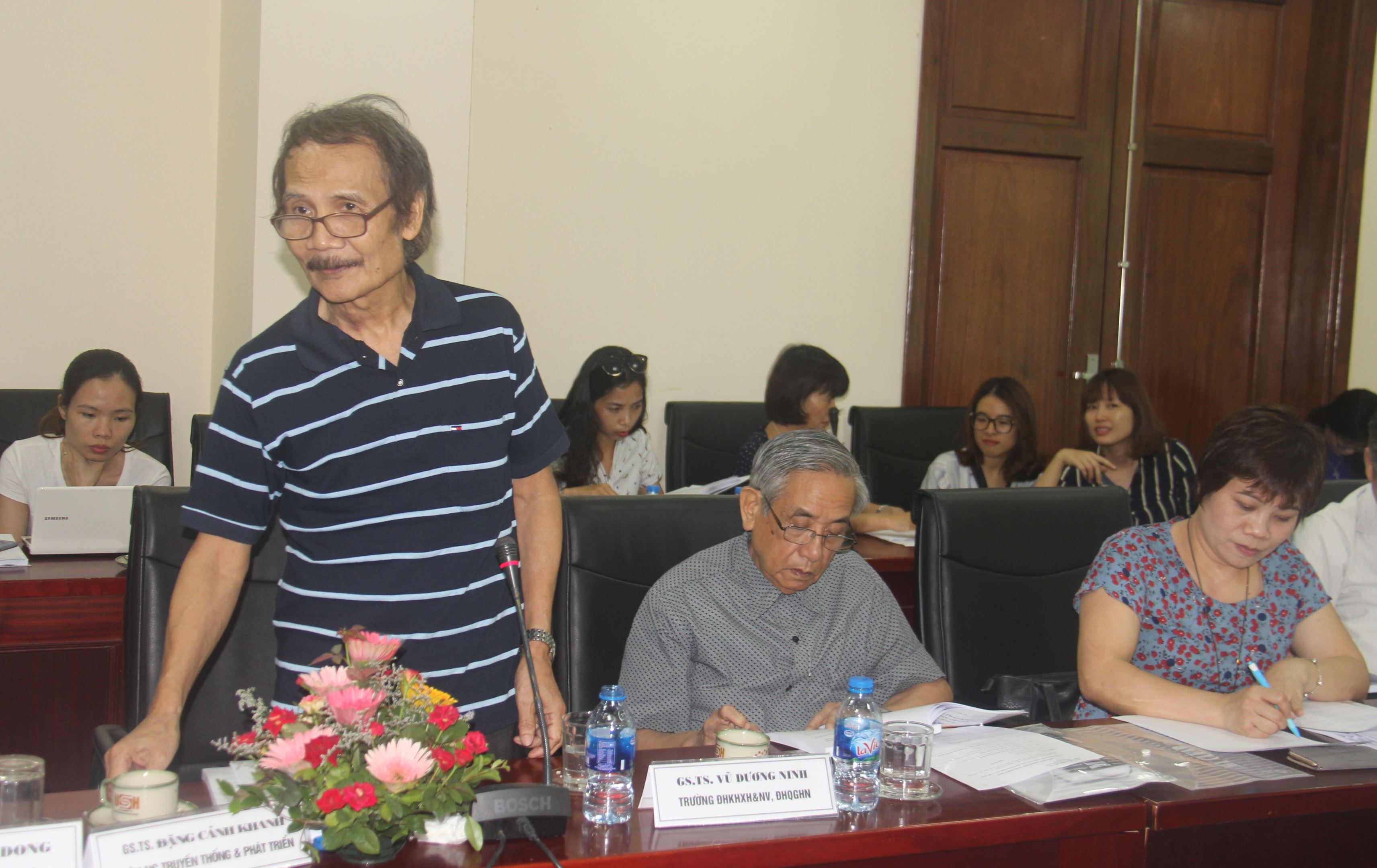
Professor Dang Canh Khanh (Institute for Traditional and Development Studies) praised Nguyen Trai's "civil governance" ideology in governing the country.
With the presentation "Some thoughts on the issue of social development management according to Nguyen Trai's "civil governance" perspective in the current context of our country", the Professor commented: the outstanding cultural and ideological figure Nguyen Trai had profound thoughts on moral governance, legal governance and created one of the basic principles in the management of the country of the Vietnamese people - the principle of "civil governance", which means using knowledge and culture to govern the country. Accordingly, a society that is maintained and developed cannot be without law and morality. But law and morality need to be built on the basis of an increasingly high cultural foundation of the nation. That thought of Nguyen Trai still has its value in today's context because it is impossible to manage society well without a common foundation of knowledge and knowledgeable people.
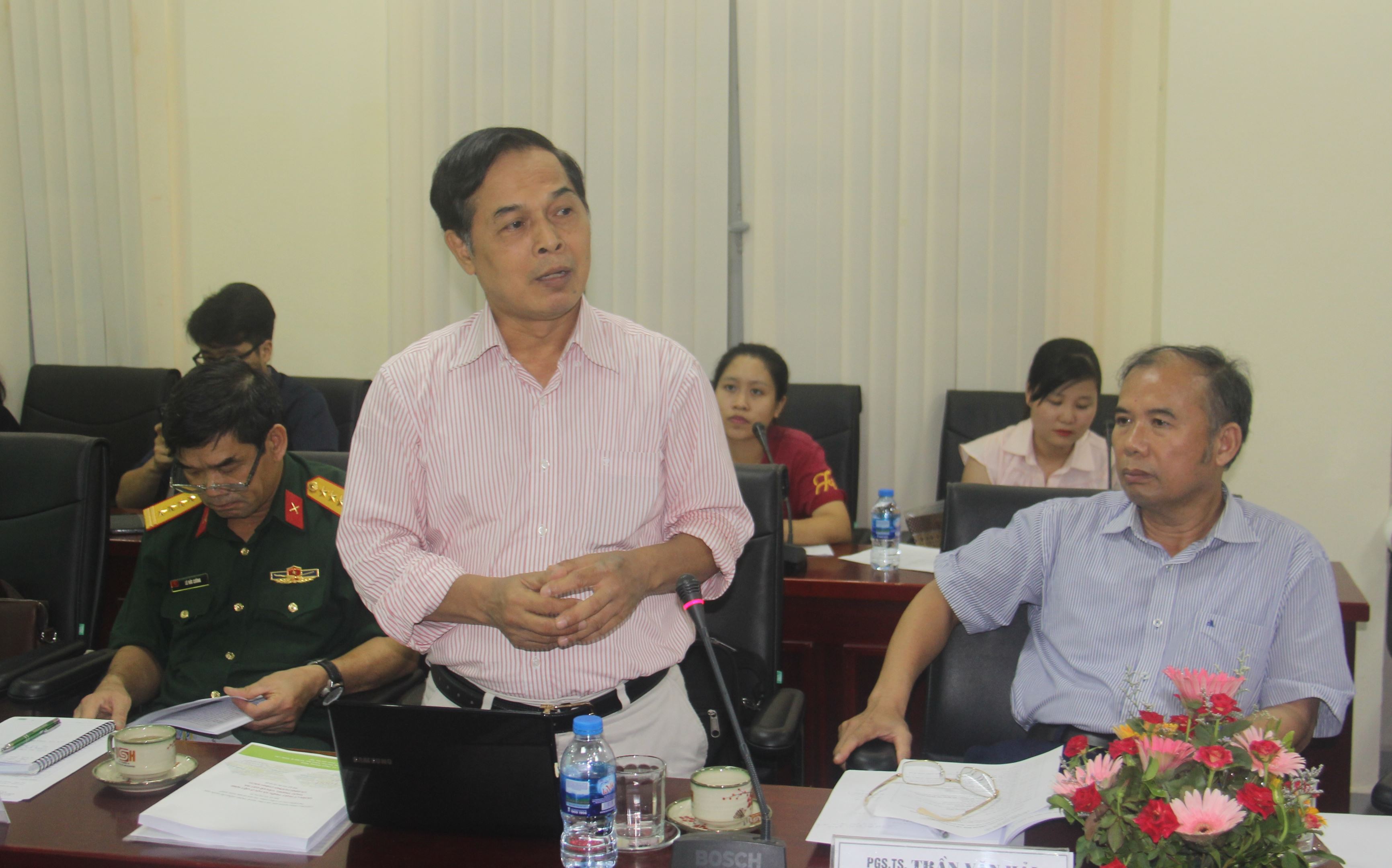
Associate Professor Dr. Hoang Ba Thinh (University of Social Sciences and Humanities) said that social management in Vietnam does not have the active and proactive participation of the community and people.
With the presentation "Some factors affecting the process of social development management in Vietnam today and the issues raised", Prof. Hoang Ba Thinh and Dr. Doan Thi Thanh Huyen pointed out the challenges that social development management in Vietnam is facing. These are the cumbersome and overlapping apparatus system, the quality of the management apparatus has not met the requirements, low salaries and benefits have not created motivation for people working in the state sector... Social management in Vietnam today is still mainly based on the top-down management model without paying due attention to the management model with the participation of the people and the community. The role of the community participating in social management, from the bottom up and participating proactively has not received due attention.
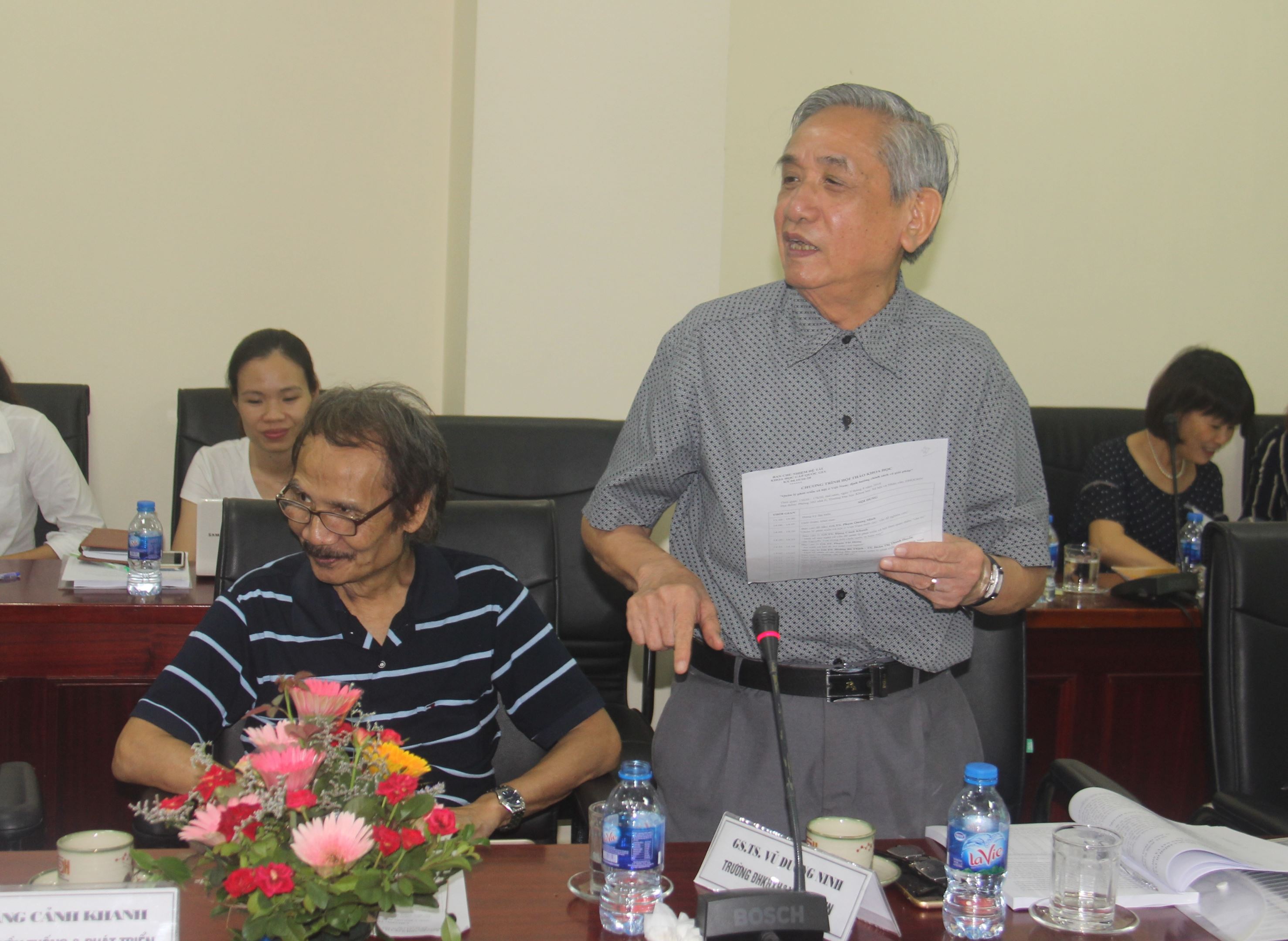
Professor and People's Teacher Vu Duong Ninh (University of Social Sciences and Humanities) said: the country's elite intellectuals in any historical period play an extremely important role in managing social development.
Highlighting the role of elite intellectuals in leading society, Professor Vu Duong Ninh (Chairman of the Association of Former Teachers of the University of Social Sciences and Humanities) said: For a while, we downplayed the role of intellectuals and did not listen to their opinions, leading to incorrect management and handling of social issues. Therefore, we should not be afraid of intellectuals but should listen to and take advantage of them, and respect their ideas even when they go against the majority.
From the perspective of studying the role of the grassroots political system in Vietnam today, Associate Professor, Dr. Nguyen Minh Phuong said that the commune is a grassroots administrative unit in rural areas - a large area that accounts for the majority of the total number of grassroots units in our country. It is the place where traditional cultural values and customs of the community are preserved. Therefore, this grassroots political system plays a very important role in connecting family members and communities, preserving and promoting national cultural identity, and developing cultural and social values. Therefore, the requirement is that the grassroots political system must catch the right pulse, arouse and promote this community spirit.

Associate Professor, Dr. Ngo Thanh Can (National Academy of Public Administration) discusses administrative reform to promote social development management.
Discussing the urgent need to reform the administrative system to promote social management in Vietnam, Associate Professor, Dr. Ngo Thanh Can said: "There are no poor countries, only poorly managed countries". He proposed specific administrative reform contents: Administrative reform towards leading and oriented activities focusing on building legal documents to ensure business development, creating conditions for economic development; overcoming overlapping functions between state agencies; creating an environment for fair and equal development; promoting decentralization of state administrative management between the central and local levels towards serving people and organizations; building a team of competent cadres and civil servants...
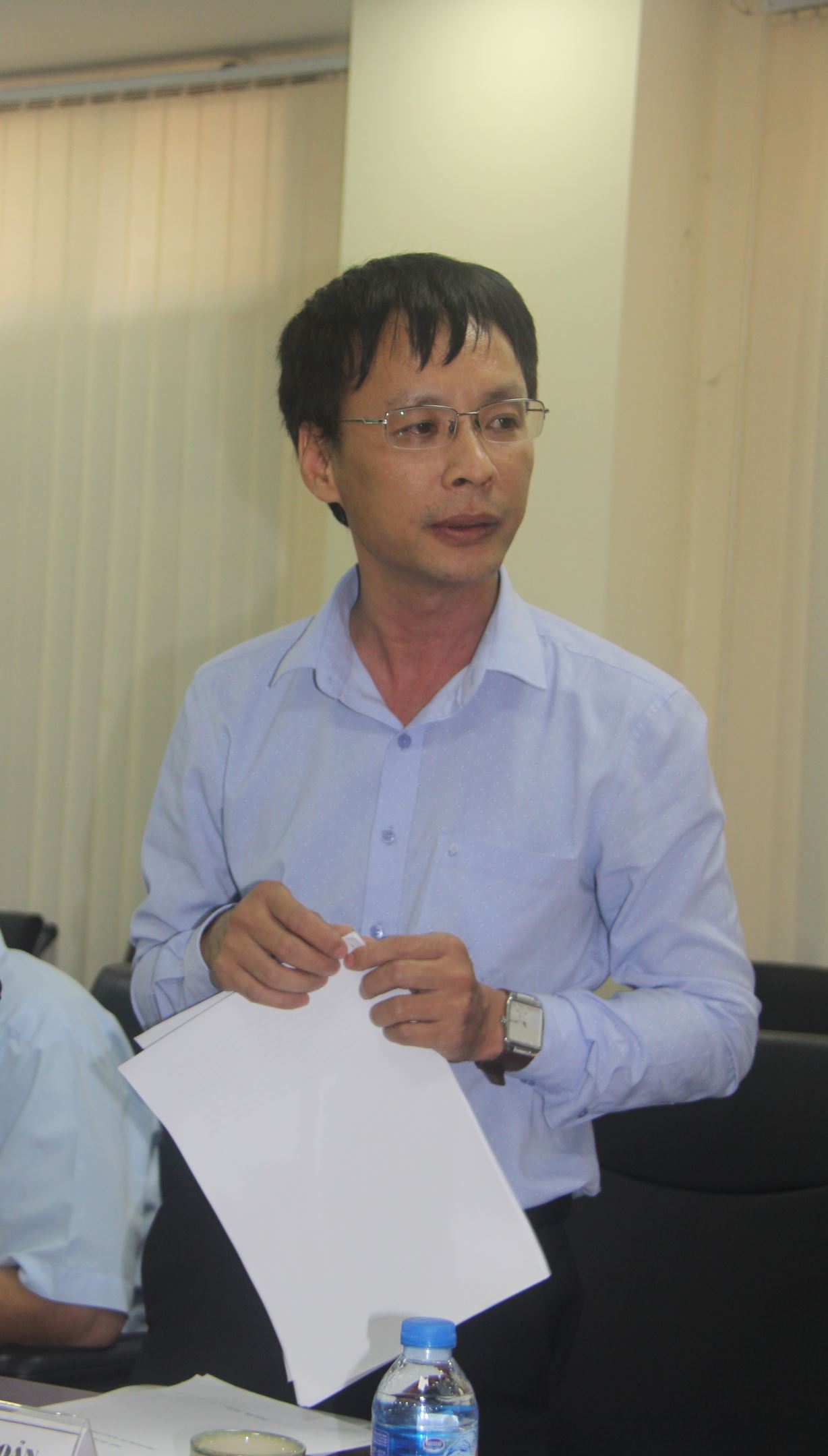
Dr. Nguyen Ngoc Toan (Department of Social Protection, Ministry of Labor - Invalids and Social Affairs) said that receiving social assistance is the right of the people.
Referring to the implementation of social assistance policies for vulnerable groups, Dr. Nguyen Ngoc Toan (Department of Social Protection, Ministry of Labor, War Invalids and Social Affairs) brought a new approach when considering these activities as the responsibility of the State to ensure the rights - the right to equality of the people. First of all, it is necessary to change the mindset to consider this as the right of the people, not as humanitarian assistance activities. Social work models must take into account supply and demand. Social assistance activities need to gradually shift the responsibility from the State to socialization.
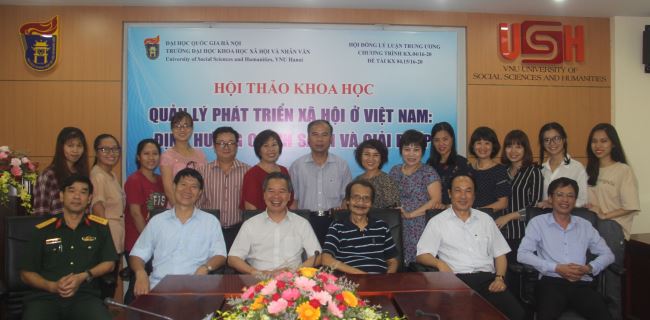
Associate Professor, Dr. Tran Thi Thanh Thuy (Institute of Leadership and Public Policy) mentioned 5 outstanding characteristics of Vietnam's current social development that policy makers need to take into account. That is, society is changing rapidly, sometimes abnormally and unpredictably. The Internet and technology are strong and profound influences on all areas of social development. Society is becoming more and more "open" and the boundaries between regions are becoming more and more "blurred". The risk of conflict is increasing, especially conflicts of values. The individualization of human and social needs and ways to meet them is becoming a trend... Therefore, she suggested that it is necessary to have a historical and cultural approach, combined with a survey of the current social situation to have a comprehensive view to orient the development of policies and solutions for social development management.
Author:Thanh Ha
Newer news
Older news